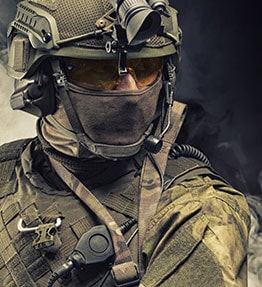The Difference Between Level II and Level IIIa Armor

When purchasing body armor, it is essential to know the difference between various types because of the vast range of armor available. Deciding between body armor can be simple if you know what you need. The size, the shape, and the protection are all essential factors that determine your purchase.
Level II and Level IIIa are two of the most popular types of body armor, but what is the difference?
Both types of armor are typically soft and made of woven materials, although Level III armor can also come in a hard plate. Despite these similarities, the two levels differ greatly. Level III armor is much stronger than Level II. It can protect the wearer from multiple rounds from a handgun as well as sub-machine gun rounds. Level II armor can also protect the wearer from bullets and is primarily tested against the .357 Magnum bullet. Whereas Level IIIa armor is designed to stop .44 Magnum bullets.
Level IIIa armor typically protects the wearer from some heavy-duty guns. But, some Level IIIa armor can actually reduce the risk of knife and spike injuries too, however, this depends on the fabric of the body armor and can differ with every product. SWAT teams and certain military members are most likely to wear this type of body armor.
Despite its strong protection level, Level IIIa armor is often too heavy for daily use by certain professions, like police or security personnel. It is a thick armor and is designed for a strong battery-firing device (BFD). Therefore, Level IIIa is better suited to those who may encounter a severe threat.
Whereas, Level II armor is better suited for security or police as it is more lightweight and allows the wearer to have greater mobility. Although the military rarely uses Level II, it is not weak body armor. In fact, the armor is more than adequate at protecting the wearer from street violence or 9mm handguns. This armor provides the ideal protection whilst also being lightweight. It is easy to run in, especially in fast-paced situations. First-time buyers usually purchase this type of armor.
However, SafeGuard Clothing provides a great variety of body armor and even offers lightweight Level IIIa armor – a product not always seen. This is ideal for police or security who want more heavy-duty armor but in a lightweight style. The product allows the wearer to be protected from more severe threats, whilst having great ease of mobility.
When purchasing body armor, customers frequently buy a carrier alongside the armor. The carriers come with a MOLLE system and allow the wearer to have a hard ballistic plate under their armor for added protection. Carriers are easy to take on and off and are extremely lightweight.
Before using either of these body armors, ask yourself what your needs are and what level of protection you require.
 US
US UK
UK SE
SE NL
NL FR
FR ES
ES DE
DE







